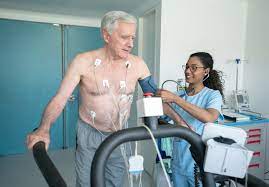Home News

Cardiovascular diseases (CVD) remain a significant global health challenge, affecting millions of lives each year. From heart attacks to coronary artery disrisk factoreases, the impact of these conditions extends beyond physical health to encompass emotional, psychological, and social aspects of well-being. Amidst these challenges, cardiovascular rehabilitation emerges as a beacon of hope, offering a structured pathway to recovery and a renewed lease on life. In this blog, we delve into the world of cardiovascular rehabilitation, exploring its importance, key components, and the transformative impact it has on individuals recovering from heart-related events.
Understanding Cardiovascular Rehabilitation
Cardiovascular rehabilitation is a specialized program designed to aid individuals recovering from heart-related issues, such as heart attacks, bypass surgeries, or heart failure. This comprehensive approach seeks to optimize physical and emotional well-being while reducing the risk of future cardiac events. By combining exercise, education, counseling, and lifestyle adjustments, cardiovascular rehabilitation addresses the complex needs of patients on their journey to recovery.
Key Components of Cardiovascular Rehabilitation
Tailored Exercise Programs: Under the guidance of trained professionals, patients engage in customized exercise routines that gradually build cardiovascular fitness and strength. Exercise not only strengthens the heart muscle but also enhances circulation, improves endurance, and boosts overall well-being.
Education for Empowerment: Knowledge is a powerful tool in managing cardiac health. Patients receive education about heart health, s, medications, and lifestyle modifications. This information empowers individuals to make informed choices and actively participate in their recovery journey.
Risk Factor Management: Cardiovascular rehabilitation addresses modifiable risk factors like hypertension, high cholesterol, diabetes, and smoking. Through education and support, patients learn strategies to control these factors and reduce the likelihood of future cardiac events.
Psychosocial Support: The emotional impact of a heart-related event can be profound. Counseling and psychological support sessions help patients navigate the emotional challenges, anxiety, and stress that often accompany such events.
Lifestyle Changes: Long-lasting recovery requires sustainable lifestyle changes. Patients are guided through adopting healthier eating habits, quitting smoking, managing stress, and maintaining a balanced routine.
Benefits of Cardiovascular Rehabilitation
Enhanced Cardiovascular Fitness: Regular exercise helps strengthen the heart muscle, improve circulation, and increase the heart's efficiency in pumping blood. This leads to improved endurance and overall cardiovascular fitness.
Reduced Risk of Complications: Cardiovascular rehabilitation significantly lowers the risk of future cardiac events, hospital readmissions, and complications, contributing to a higher quality of life.
Improved Psychological Well-being: Engaging in rehabilitation not only improves physical health but also provides emotional support, helping patients cope with anxiety and depression often associated with heart-related events.
Empowerment and Confidence: Education equips patients with the knowledge to take control of their health, leading to a sense of empowerment and renewed self-confidence.
Holistic Recovery: By addressing physical, emotional, and lifestyle factors, cardiovascular rehabilitation offers a holistic approach that positively impacts various aspects of patients' lives.
Conclusion
Cardiovascular rehabilitation stands as a testament to the potential of human resilience and medical innovation. It offers individuals a second chance to rebuild their lives after cardiac events, fostering physical recovery, emotional well-being, and empowerment. By combining exercise, education, counseling, and lifestyle adjustments, this comprehensive program paves the way for a healthier future while reducing the burden of cardiovascular diseases. As we continue to advance in medical knowledge and technology, cardiovascular rehabilitation remains a beacon of hope, showcasing the remarkable capacity of individuals to heal, grow, and thrive even in the face of life-altering challenges.